'What Shakespeare & Co. Taught Me'


 |
|
| Village Books' Dee Robinson rehearsing for retirement. | |
Dee Robinson, longtime co-owner of Village Books, Bellingham, Wash., is retiring at the end of the week. On Facebook, she wrote, "It's been a great job for 34 years. On to whatever awaits, starting with a pile of books!" Chuck Robinson, her husband and co-owner, who has no plans to retire soon, said that Dee had intended to retire more than three years ago, but stepped in to buy gift items when the longtime manager of Village Books' Paper Dreams store decided to retire. Now, he said, Dee "wants to eat bon bons and read all of those books she's been stacking up."
Originally involved in special education in the Midwest, the Robinsons moved to Bellingham and founded Village Books in 1980. Together they built it into one of the country's great independent bookstores, one that's been a leader in showing how indies can be creative and thrive. For example, Village Books has an extensive author events program, an Espresso Book Machine, a self-publishing program, its own publishing program, its own radio variety show, used and bargain books, a gift store, a café with beer and wine and a strong digital books presence. We wish Dee a fun, well-deserved retirement and hope she tags along with Chuck to many bookselling conferences and events!
 The Bookworm, Omaha, Neb., is moving a mile, to quarters in Loveland Centre, a new shopping center, the Omaha World-Herald reported. The Bookworm has been in Countryside Village for 15 years. Owners Phillip and Beth Black told the newspaper they plan to open in the new location at the beginning of October.
The Bookworm, Omaha, Neb., is moving a mile, to quarters in Loveland Centre, a new shopping center, the Omaha World-Herald reported. The Bookworm has been in Countryside Village for 15 years. Owners Phillip and Beth Black told the newspaper they plan to open in the new location at the beginning of October.
The new Bookworm location will be a 6,184-square-foot space on one level in the middle of Loveland Centre, with LED lighting, new bookshelves on casters, a larger storeroom and other amenities. The Bookworm's current location is 6,000 square feet on two levels.
Founded in 1986, the Bookworm has had three locations. Beth Black commented: "This will be our last move."
Incidentally, last Saturday, the Bookworm honored longtime children's bookseller Ellen Scott, who is "semi-retiring" from the store. (She will continue to help out as school liaison.) Scott began her bookselling career in 1978, when she and her mother, Priscilla Wheeler, opened the Bookhouse in Omaha. After a move to Rockbrook, they closed the business in 1996. Scott has managed the Bookworm's children's department since 2001. In retirement, she plans to work in her church library, tutor, work with the Omaha Local Independent Business Alliance and enjoy more time with friends.
Last week, Bloomfield College announced the opening of its new $27 million residence hall in downtown Bloomfield, N.J., featuring commercial space on the ground floor that includes "an eatery and a Barnes & Noble, which is open and serving as the institution's bookstore," NorthJersey.com reported.
Robert Sherrill, "a provocative journalist and author who rose to prominence in the 1960s and '70s for his sharp assessments of gun culture, military justice, Lyndon B. Johnson and other complicated topics," died last Tuesday, the New York Times reported. He was 89. Sherrill's books included The Accidental President; Military Justice Is to Justice as Military Music Is to Music; and the intricately titled The Saturday Night Special: And Other Guns with Which Americans Won the West, Protected Bootleg Franchises, Slew Wildlife, Robbed Countless Banks, Shot Husbands Purposely and by Mistake, and Killed Presidents--Together with the Debate over Continuing Same.
 Women & Children First, Chicago, Ill., created a window display in response to the events in Ferguson, Mo., following the death of Michael Brown on August 9. The paintings were created by bookseller Jill Kuanfung.
Women & Children First, Chicago, Ill., created a window display in response to the events in Ferguson, Mo., following the death of Michael Brown on August 9. The paintings were created by bookseller Jill Kuanfung.
 This must be the season of floating libraries. Last week we noted the Floating Library on Cedar Lake in Minneapolis, and now New York City is getting one of its own next month. GalleyCat reported that "a pop-up library that will open on the Lilac Museum Steamship at Pier 25 on the Hudson River. Artist Beatrice Glow has curated the collection, which is made up of books focused on the arts. The boat will be docked from September 6-October 3, 2014, and will include reading and exhibition space."
This must be the season of floating libraries. Last week we noted the Floating Library on Cedar Lake in Minneapolis, and now New York City is getting one of its own next month. GalleyCat reported that "a pop-up library that will open on the Lilac Museum Steamship at Pier 25 on the Hudson River. Artist Beatrice Glow has curated the collection, which is made up of books focused on the arts. The boat will be docked from September 6-October 3, 2014, and will include reading and exhibition space."
For "lovers of art and design, a travel itinerary should always include a good bookstore among its listings of local museums and art galleries," ARTPHAIRE (via the Huffington Post) observed in showcasing the "top 10 art and design bookstores around the world."
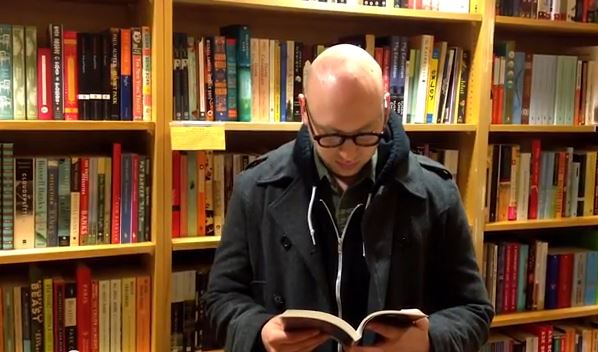
At the Primetime Emmy Awards last night, four of the major category-winning shows had book connections:
Sherlock: His Last Vow: Benedict Cumberbatch (actor, miniseries or movie), Martin Freeman (supporting actor, miniseries or movie) and Stephen Moffat (writing, miniseries, movie or dramatic special).
Orange Is the New Black, based on Piper Kerman's memoir, Orange Is the New Black: My Year in a Women's Prison: Uzo Aduba (outstanding guest actress in a comedy series)
The Normal Heart, adapted by Larry Kramer from his Tony award-winning play: television movie.
Tomorrow on MSNBC's the Cycle: Todd Glass, co-author of The Todd Glass Situation: A Bunch of Lies About My Personal Life and a Bunch of True Stories About My 30-Year Career in Stand-Up Comedy (Simon & Schuster, $25, 9781476714417).
---
Tomorrow on NPR's Diane Rehm Show: readers review Someone by Alice McDermott (Farrar, Straus & Giroux, $25, 9780374281090).
Two Clips and "a plethora of new images have arrived to get you as prepared as possible for what's coming" in Before I Go to Sleep, based on S.J. Watson's novel and directed by Rowan Joffe, Indiewire reported. The film, which stars Nicole Kidman and Colin Firth, opens October 31.
Jim Crace and Hermione Lee won the £10,000 (US$16,590) James Tait Black Memorial Prizes, which are given annually to a work of fiction and biography by the University of Edinburgh's School of Literatures, Languages and Cultures, BBC News reported.
Fiction judge Dr. Lee Spinks said Crace's Harvest "presents a spellbinding lyrical reflection upon the nature of cultural inheritance and the obligations and responsibilities of community in a changing and uncertain world. It is a novel fit to be ranked among his very best, which means that it can be considered one of the distinctive achievements of contemporary literature in English."
Biography judge professor Jonathan Wild said Lee's Penelope Fitzgerald: A Life "provides a masterclass in writing of this type. It's the perfect marriage of an excellent subject and a biographer working at the very top of her game."
In 2013, the prize was extended to include a $10,000 prize for drama. This year's winner was Cannibals by Rory Mullarkey.
A Little Lumpen Novelita by Roberto Bolaño, trans. by Natasha Wimmer (New Directions, $19.95 hardcover, 9780811223355, September 16, 2014)

One day, he brings home two friends, known only as the Bolognan and the Libyan, who arrive without a single personal item, move into the dead parents' bedroom and have a predilection for constant cleaning. Despite the casual narration, Bianca's story is often startling: "[O]ne of them came into the room and made love to me. I think it was the Bolognan."
Dispossessed, uprooted from their economic and social class, the brother and sister spend a lot of time watching videos and television. When the boys come up with a scheme to make money, Bianca begins sleeping with Maciste, the only other named character in the novelita. He's a big, fat, blind man ("like a broken refrigerator"), a former film star whom everyone calls Mr. Universe because he won the title twice in the '60s. He now has a huge private gym and supposedly a safe full of valuables, which her brother's friends are determined to rob, if only Bianca can find it.
Bianca developed strangely good nocturnal vision after her parents' violent death, but her memory is problematic. She forgets the other characters' names. She's uncertain about what really happened. She is warned never to ask Maciste about his blindness, which she promptly does, while the Bolognan and the Libyan watch "thousands of hours of television" patiently waiting to rob him.
It's fair to say that Bolaño's last novella is an exercise in ambiguity. Is there anything worth stealing in Maciste's huge house? Will Bianca's proclaimed marriage ever occur in the story? Will readers get to witness her supposed life of crime? A Little Lumpen Novelita is slight without being fragile, haunting, unpredictable, packed with setups that lack payoffs and perfectly content to wander along at its own pace without proving anything--a last rule-breaking tale from one of modern Latin American literature's original voices. --Nick DiMartino, Nick's Picks, University Book Store, Seattle, Wash.
Shelf Talker: Translated into English for the first time, this short novella about an orphaned 19-year-old girl in Rome was Chilean superstar Roberto Bolaño's last published work.
Stand Up Comics is a regular column by Adan Jimenez. These titles need no introduction: just read the column, then read some good comics!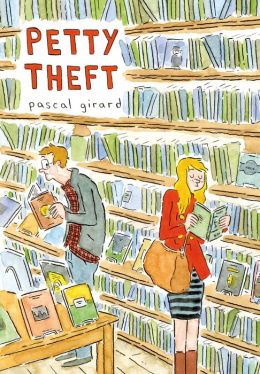
After breaking up with his girlfriend of nine years, Pascal is living in a small room at his friend's house, along with his friend's wife and their baby, while trying to figure out what to do next. He's thinking about changing his career from cartoonist to construction. He has been receiving boxes of books from his ex (as well as a giant replica of her head that he wore to a Halloween party), and he's not sure what to do with them in his small room. He's been running to keep his endorphin levels high, but then he trips and hurts his back, making running impossible. When he sees a girl steal one of his books from a local bookstore, he decides to follow her.
Girard has a clean, but wavy hand-drawn style that lends his (fictional?) memoir an extra sense of reality and immediacy, making the story more believable (even though it may not be entirely real). The plot is a humorous take on the boy-meets-girl formula, filled with book lovers, possible kleptomania, a neophyte detective, a few very awkward faux pas, and a hilariously suspicious toddler giving Pascal the side-eye every chance he gets. Best of all, no saccharine sweetness; just a middle-aged cartoonist looking for love, and a girl who maybe has a compulsion to steal books.
Handselling Opportunities: People who enjoy Canadian cartoonists' ability to make fun of themselves, and fans of not-100%-true memoirs.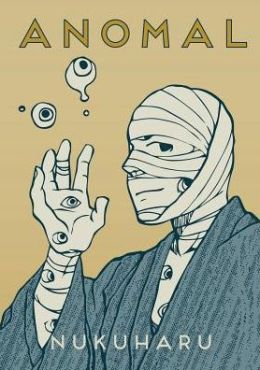
"GEN stories are published [nowhere] else in the world," Gen Manga boasts on its website. "They come straight from the artists in Japan to you. We translate the stories and put them out as they are created" Gen Manga specializes in indie and underground manga, and the short story collection Anomal certainly fits the bill.
Nukuharu's stories borrow liberally from the more traditional shonen (boys) and shoujo (girls) manga genres--there's even a little yaoi (boys' love) thrown in for good measure--but they're much stranger. All the stories feature yokai (Japanese ghosts and demons). In fact, the many-eyed yokai on the cover is featured in the first story, "Kaeshi," about a blind artist who makes a deal to get his sight back. The other four stories feature man-eating demons, half-yokai humans, shape-changing aliens and eccentric detectives, and are at turns comedic and serious.
The collected stories have a twist to them that make them even stranger than is apparent at the beginning, but in a good way. Nukuharu's decision occasionally to forgo traditional storytelling techniques adds to an already eerie atmosphere. Be warned, though; this is not your usual manga. It's much weirder.
Handselling Opportunities: Manga enthusiasts ready to try something outside the established genres, and Western indie comics fans looking to sample something outside their cultural comfort zones.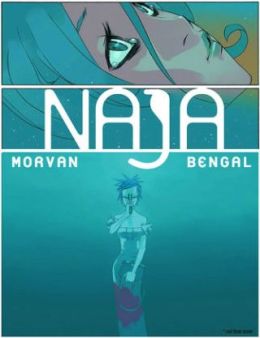
Naja is Zero's number three assassin. She does whatever he commands, and never asks why, even though she has no idea who he is. She doesn't feel pain or sensations of any kind or have any emotions beyond indifference. But that all changes when "He" enters the picture and tells her Zero's number one assassin, Max, is gunning for her. And Number Two is waiting somewhere in the wings.
The first thing readers will notice when picking up Naja is the gorgeous art. Bengal is fairly unknown outside of France, but anyone who experiences his clean lines and color palette, his architecture and overall design sense will immediately make one want to own everything he has ever drawn and illustrated.
J.D. Morval's writing is quite good, but it may take the average reader a while to get used to the narrator of the story. Morval's characters are all well-delineated and quite interesting, especially the three assassins: Max, Number Two and Naja all play off each other quite well. I will not mislead you, however: the ending is a bit out of left field and doesn't make an inordinate amount of sense, but it doesn't detract too much from the overall enjoyment of the book.
Handselling Opportunities: People who enjoy a good action movie in book form, and people who love to stare at gorgeous art for hours.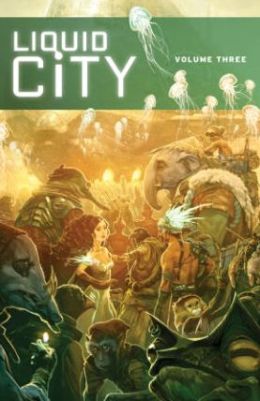
"If you knew the world was ending, what would be the story you would most want to tell?" This is the question Liquid City showrunner Sonny Liew posed to Southeast Asian writers and artists, and he received a lot of amazing responses, from the fantastical and apocalyptic to the realistic and personal.
As in most anthologies, there are both truly outstanding stories and some that are less so, but the majority of the stories in Liquid City are excellent. These include Elvin Ching's "Boy," which details his discovery of what it means to become a man during the mandated military service that all Singaporean males must fulfill; Max Loh's "Before the End of the World: An Abridged Travelogue," in which he and five friends travel to Japan again before the Mayan apocalypse; Nguyen Thanh Phong's "Pig When Small, Cow When Big," about the ways in which Vietnamese farmers raise pigs to sell to butchers, who then disguise some of that pork as beef with seasoning packets; and Charlie Chan Hock Chye's "Geylang Hill," about how and why we remember our youth.
My personal favorite is Jin Hien Lau's "The Orson Welles of Darussalam," a hilarious tale about pirated cable and one boy's belief that the world is ending after watching a snippet of War of the Worlds-style programming.
Handselling Opportunities: People who want to discover talent they may have never encountered before, and people who like their reading as they like their buffets: with a little bit of everything.